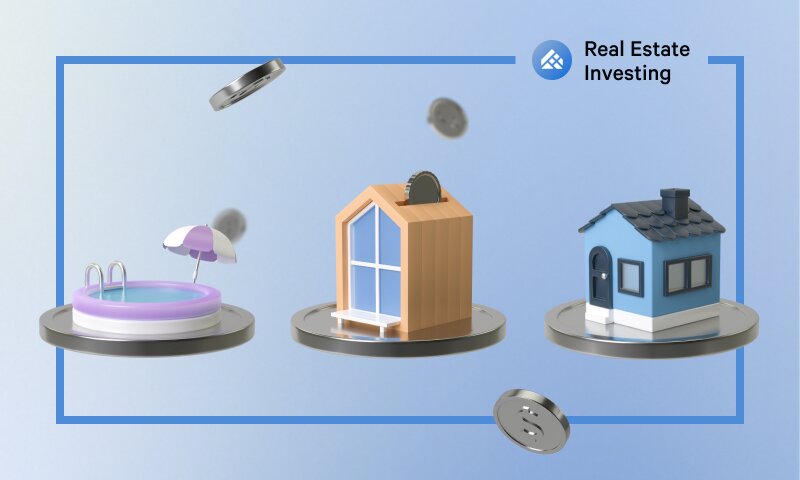The real estate market encompasses various investments, from cozy homes where families build memories to towering commercial structures that drive business. As an investor, understanding each type of property's unique characteristics and considerations can be the key to making informed decisions and running a profitable long-term business.
Let’s talk about the different types of real estate investments and how to decide which is the right fit for you.
Residential Real Estate
Residential real estate refers to properties designed and used for living, such as single-family homes, apartments, condominiums, and townhouses. These real estate properties are primarily intended for individual use, distinguishing them from commercial or industrial real estate.
Residential real estate is a cornerstone of the real estate market, and its value is often influenced by factors like location, amenities, and the overall housing market conditions.
The primary types of residential real estate investments include:
- Single family residential properties: Detached houses designed for one family, providing independent living spaces.
- Condominiums (condos): Individual units within a larger complex, where residents own their units and share common areas and amenities.
- Apartments: Multi-unit buildings where individuals or families rent living spaces. Each unit is a separate residence.
- Townhouses: Multi-level homes that share walls with adjacent units, often forming a row or a complex.
- Cooperative apartments (co-ops): Like condos, residents own shares in the entire building, giving them the right to occupy a specific unit.
- Duplexes and triplexes: Multi-family properties with two or three separate living units, often appealing to real estate investors and residents.
- Mobile homes: These houses can be transported and are often in mobile home parks.
- Vacation homes: Vacation homes or rentals are used for short stays, such as holiday retreats.
Reasons to Invest in Residential Real Estate
- Steady income potential: Residential properties, particularly rental units, can provide a steady stream of rental income, offering financial stability for investors.
- Portfolio diversification: Diversifying your investment portfolio through residential real estate can help spread risk across multiple real estate asset classes, contributing to reduced overall risk exposure.
- Long-term appreciation: Residential properties often appreciate over the long term, providing potential capital gains when sold.
- Tax benefits: Investors may benefit from tax advantages, including deductions for mortgage interest, property taxes, and certain expenses related to property management.
- Home value increase: The potential for increased home values can be attractive to investors in single-family homes, especially in areas experiencing economic growth or development.
- Stability: Residential real estate has historically shown resilience, with housing markets often recovering from housing market recessions or economic downturns.
- Lower barriers to entry: Compared to commercial or industrial real estate, residential properties generally have lower entry barriers, making them more accessible for individual investors.
- Demand for rental housing: The demand for rental properties remains strong, providing investors with opportunities to generate rental income in urban and suburban markets.
- Property management: Residential property investors have more direct control over property management and maintenance, allowing them to influence investment property performance.
- Short-term profit: House flipping, a short-term strategy within residential real estate, offers a unique avenue for a potential quick profit. Investors acquire a property, renovate it, and swiftly reintroduce it to the market, potentially yielding substantial returns and thereby increasing its liquidity.
Commercial Real Estate
Commercial real estate encompasses properties used for business or income-generating purposes rather than residential living. Factors like location, accessibility, economic trends, and the demand for specific types of commercial spaces influence the value of commercial properties.
Investors in commercial real estate may aim for rental income, property appreciation, or a combination of both, making it a diverse and dynamic sector within the real estate market.
The primary types of commercial real estate include:
- Office buildings: Spaces designed for business operations, ranging from small office spaces to large corporate headquarters.
- Retail spaces: Properties for businesses that sell goods or services directly to consumers, such as storefronts, strip malls, or shopping centers.
- Hotels and hospitality: Provide accommodations and services for travelers, including hotels, motels, resorts, and bed-and-breakfast establishments.
- Multifamily properties: Commercial properties designed to house multiple families, such as apartment complexes.
- Special-purpose properties: These are unique properties designed for specific uses, such as healthcare facilities, educational institutions, religious centers, gas stations, or storage facilities.
- Mixed-used developments: Properties that combine different types of commercial real estate with a single development, often integrating residential, commercial, and recreational spaces.
Reasons to Invest in Commercial Real Estate
- Higher income potential: Commercial properties, such as office spaces or retail centers, can generate higher rental income than residential properties, providing investors with increased cash flow.
- Long-term appreciation: Similar to residential real estate, commercial properties are generally illiquid but can appreciate over time, offering potential capital gains when sold.
- Diversification: Investing in commercial real estate allows for portfolio diversification, potentially reducing risk by including different asset classes in a real estate investment strategy.
- Triple net leases: In some commercial leases, renters may be responsible for property expenses like property taxes, insurance, and maintenance, relieving landlords of certain financial burdens.
- Lease terms and stability: Commercial leases typically have longer terms than residential ones, potentially providing investors with more stable and predictable income.
- Tenant stability: Commercial tenants, especially in well-located properties, tend to be stable and established businesses, which can reduce the risk of frequent turnover.
Industrial Real Estate
Industrial real estate refers to properties used for industrial activities, manufacturing, production, warehousing, and distribution. These properties facilitate the efficient functioning of industrial businesses, accommodating processes such as manufacturing goods, storing inventory, and transporting products.
The value of industrial properties is often influenced by proximity to transportation hubs, the availability of labor, and the overall economic landscape. Investors in industrial real estate may seek rental income from tenants engaged in industrial activities, making this sector integral to the broader real estate market.
The main types of industrial real estate include:
- Warehouses: Facilities for storing goods and products, ranging from small storage units to large distribution centers.
- Manufacturing facilities: Spaces equipped for producing goods, often involving machinery and assembly lines.
- Distribution centers: Specialized warehouses designed to efficiently store and distribute products to retailers, wholesalers, or consumers.
- Flex spaces: Versatile spaces that can be adapted for various industrial uses, combining office and warehouse elements.
- Research and development (R&D) facilities: Properties dedicated to innovation, research, and development of new products or technologies.
- Cold storage facilities: Specially designed spaces equipped to store goods at low temperatures, often used for perishable items like food and pharmaceuticals.
- Data centers: Designed to house computer systems, servers, and related components for data storage and processing.
- Light industrial spaces: Accommodate lighter manufacturing activities, typically involving assembly or production with minimal heavy machinery.
Reasons to Invest in Industrial Real Estate
- Potential for stable income: Industrial properties like warehouses and distribution centers often provide stable and reliable rental income due to long-term lease agreements with tenants.
- Growing e-commerce demand: The rise of e-commerce has increased the demand for industrial spaces for logistics and distribution, making it a favorable sector for investment.
- Limited tenant turnover: Industrial tenants tend to have longer lease terms and lower turnover rates than tenants in other real estate sectors, providing investors with consistent cash flow.
- Role in the supply chain: Industrial real estate plays a crucial role in the supply chain, making it resilient to economic fluctuations and maintaining its relevance in various market conditions.
- Scalability and flexibility: Industrial properties can be adapted for various uses, offering flexibility for different tenants and adapting to changes in market demand.
- Value appreciation: Strategic locations close to major transportation hubs and logistics networks can experience property value appreciation over time.
- Triple net leases: Some industrial leases may include triple net structures, where tenants are responsible for property expenses, providing a more hands-off investment for landlords.
- Global trade: Industrial real estate is influenced by international trade dynamics, making it sensitive to economic growth and globalization trends.
- Infrastructure developments: Proximity to crucial infrastructure developments, such as highways, ports, and railroads, can enhance the value and attractiveness of industrial properties.
- Low maintenance: Industrial properties may require lower ongoing management efforts compared to other real estate types.
Land
A land investment in real estate involves acquiring and holding undeveloped or vacant land with the expectation of potential future appreciation or development. Unlike residential, commercial, or industrial properties, land investments typically do not generate immediate income through rent or lease. Instead, investors may bank on the land’s intrinsic value, anticipating growth in the surrounding area, changes in zoning regulations, or future development opportunities that could enhance the land’s worth.
The success of a land investment depends on factors such as location, zoning laws, economic trends, and the potential for future development or use. Investors in land may choose to hold the property for the long term or engage in strategic development or resale based on market conditions and their investment goals.
The main types of land investments include:
- Undeveloped land: Land that has yet to undergo construction or significant alterations. Investors may buy undeveloped land expecting future development or changes in land use regulations.
- Recreational land: Land purchased for recreational purposes, such as hunting, fishing, or outdoor activities. Scenic locations or proximity to natural attractions often drive the value of recreational land.
- Agricultural land: Land used for farming or agricultural purposes, such as crop cultivation or livestock grazing. Agricultural land may vary in fertility and suitability for specific crops.
- Subdivision land: Land purchased to be divided into smaller parcels for residential or commercial development.
- Brownfield and greenfield sites: Brownfield sites refer to previously developed land that may be underused or contaminated, requiring remediation. Greenfield sites are undeveloped or agricultural land.
Reasons to Invest in Land
- Potential for appreciation: Land, especially in developing areas, has the potential for significant appreciation over time as the surrounding area evolves and infrastructure improves.
- Diverse usage possibilities: Land offers versatility in terms of use. Depending on zoning regulations, it can be developed for residential, commercial, agricultural, or industrial purposes, providing various investment options.
- Strategic location advantages: Well-located lands, such as parcels near major transportation routes, growing urban areas, or scenic locations, can experience increased value due to the strategic location.
- Hedge against inflation: Land is often considered a tangible asset that can hedge against inflation, preserving value even in economic downturns.
- Long-term potential: While development may take time, patient investors may benefit from holding land as urban expansion or infrastructure development reaches the area.
- Tax advantages: Depending on local regulations, tax advantages may be associated with owning and holding land, such as reduced property taxes or incentives for specific land use types.
- Portfolio diversification: Including land in an investment portfolio can contribute to diversification, spreading risk across different asset classes.
- Income generation: Land can generate income through various means, such as leasing for agricultural purposes, renting for events, or securing revenue through cell tower leases.
- Environmentally friendly investments: Investing in conservation land or areas with environmental value can align with sustainability goals and contribute to environmental conservation efforts.
- Development potential: Investors may purchase land for future development, either for residential, commercial, or mixed-use projects, capitalizing on anticipated growth.
Read Next: Lesson 2 — Different Ways to Invest in Real Estate
Interested in adding real estate to your portfolio? With Arrived, anyone can invest $100 to $15,000 per property in a range of single-family residential homes and vacation rentals across dozens of markets or opt for the always-available, instant diversification offered by the Arrived Single Family Residential Fund.









